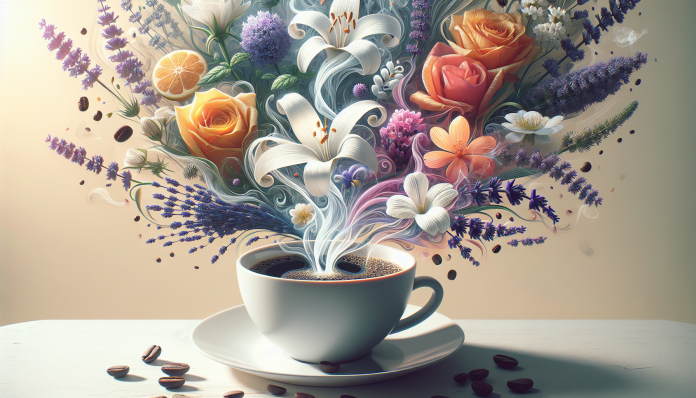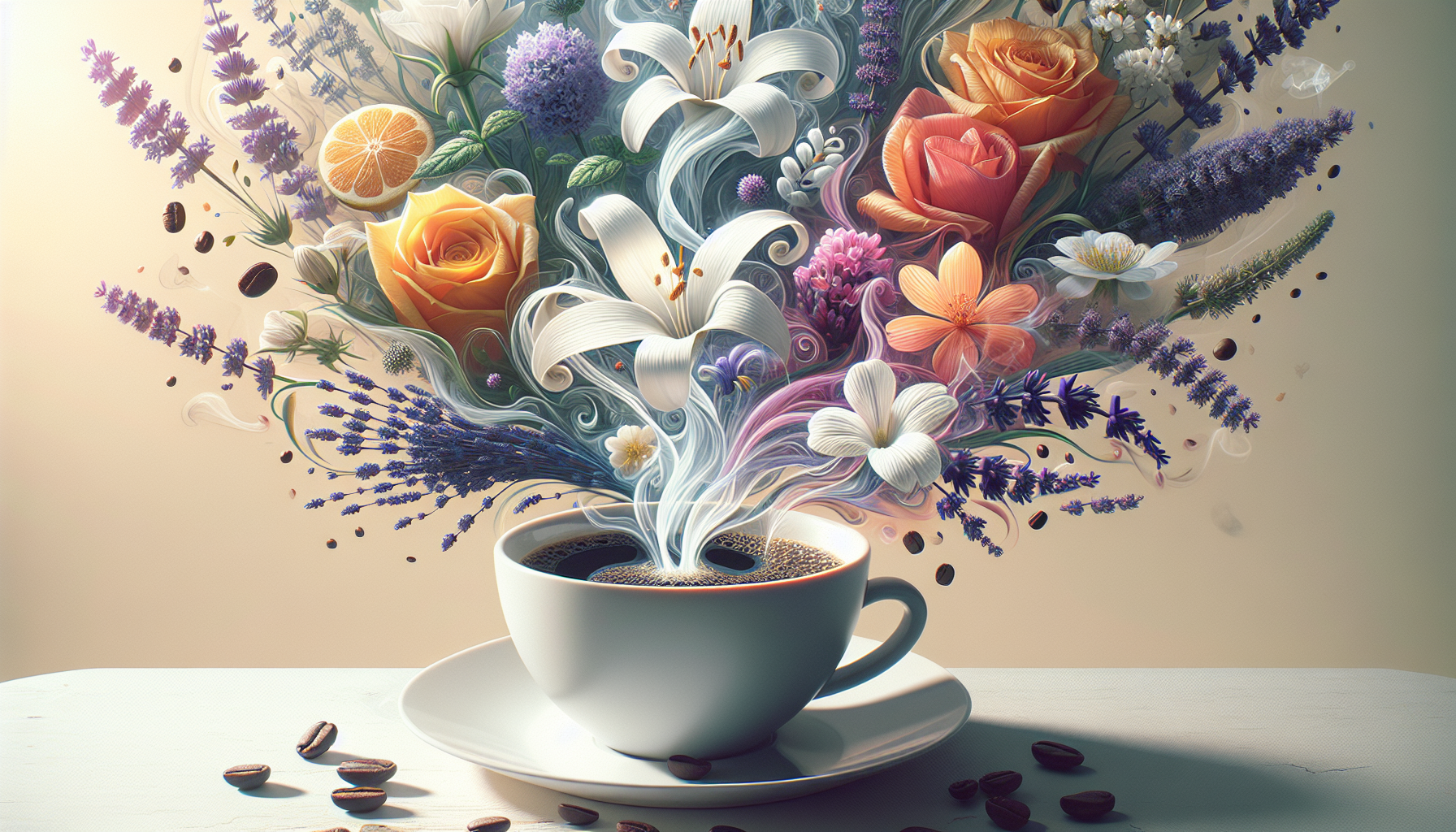Indulge in the enchanting world of floral coffee and allow your senses to be transported to a blooming garden filled with delicate aromas. From hints of jasmine to vibrant notes of lavender, these floral infusions bring a touch of elegance to your daily caffeine fix. Embark on a journey of exquisite flavors that awaken your taste buds and leave you yearning for more. Experience the true artistry of coffee as it intertwines with the natural beauty of flowers, creating a delightful symphony of fragrances that will captivate your senses and elevate your coffee-drinking experience to a whole new level.
Understanding Floral Coffee
What is floral coffee?
Floral coffee is a unique and distinct type of coffee that is celebrated for its delicate and nuanced floral aromatics. It is characterized by its fragrance and vibrant floral flavors, which add an extra layer of complexity to the coffee-drinking experience. Floral coffee is created by infusing the beans with the natural scents and flavors of various flowers during the brewing process, resulting in a beverage that is both aromatic and flavorful.
How is floral coffee different from other types of coffee?
Floral coffee stands apart from other types of coffee due to its distinctive floral aromatics. While traditional coffees may have more earthy or nutty flavors, floral coffees offer a refreshing change with their vibrant floral notes. The floral essences infused in the beans during brewing give floral coffees a delicate and fragrant taste that is difficult to find in other varieties. The floral flavors elevate the overall coffee experience, making it a unique and enjoyable choice for coffee enthusiasts.
Common origins of floral coffee
Floral coffee can be found in various regions around the world, each with their own characteristic floral profiles. Some of the most common origins of floral coffee include Ethiopia, Colombia, Costa Rica, and Yemen. These regions are known for their fertile soil, optimal climate conditions, and diverse flora, which contribute to the development of complex and aromatic floral coffee flavors. The specific flowers used in the brewing process may vary depending on the region and the coffee producer’s preferences, resulting in an array of floral coffee varieties to explore.
The brewing process for floral coffee
The brewing process for floral coffee involves infusing the beans with floral aromatics during the coffee extraction. This can be achieved through various methods, including adding flower petals or extracts directly to the grounds, using floral-infused water for brewing, or even steeping the beans in a mixture of water and fresh flowers. The aim is to allow the natural floral essences to permeate the coffee, creating a harmonious blend of floral aromatics and flavors. The brewing time and temperature will vary depending on the specific coffee beans and floral ingredients used, ensuring optimal extraction of the floral notes.
Exploring the Aromatics
The importance of aroma in coffee
Aroma plays a vital role in our perception of coffee. It is often the first sensory experience we have when encountering a cup of coffee, setting the stage for our expectations of taste and flavor. The aroma of coffee is a complex combination of volatile compounds that are released during the brewing process. It can range from earthy and nutty to fruity or floral, with each aroma profile contributing to the overall sensory experience. Floral aromatics, in particular, add an extra layer of excitement and delight to the coffee-drinking experience, creating an enticing fragrance that captivates the senses.
Characteristics of floral coffee aromatics
Floral coffee aromatics are characterized by their delicate, fragrant, and often sweet notes. These can range from subtle hints of jasmine or lavender to more pronounced floral scents reminiscent of roses or hibiscus. The floral aromatics intermingle with the underlying coffee notes, creating a harmonious bouquet that enhances the overall drinking experience. When properly brewed, floral coffees entice the senses with their captivating aromas, providing a pleasant and aromatic journey that complements the flavors in every sip.
Identifying floral notes in coffee
Identifying floral notes in coffee requires a keen sense of smell and a bit of practice. When tasting floral coffee, pay attention to the aromas that waft from the cup. Look for scents that remind you of fresh flowers or floral perfumes. Sniff deeply and try to discern specific floral characteristics, such as the heady scent of jasmine or the delicate sweetness of rose petals. Take note of any floral flavors that linger on your palate after each sip. The more you explore and familiarize yourself with floral coffee, the better able you will be to identify and appreciate the nuanced floral notes.
Difference between natural and artificial floral aromatics
It is important to note the difference between natural and artificial floral aromatics in coffee. Natural floral aromatics are derived from real flowers, either through direct infusion or the use of essential oils extracted from flowers. These natural aromatics add an authentic and subtle floral essence to the coffee. On the other hand, artificial floral aromatics are synthetic compounds that mimic the scent and flavor of flowers. While they can still contribute to a floral coffee experience, the result may be less nuanced and authentic compared to using natural floral ingredients. It is often preferred to opt for coffee that utilizes natural floral aromatics for a more genuine and satisfying flavor.
The Role of Flowering Plants
How flowering plants contribute to coffee flavor
Flowering plants play a crucial role in coffee flavor development. Coffee beans are the seeds of the coffee plant and are formed within the fruit known as the coffee cherry. The flowering phase of the coffee plant is when the plant produces blossoms that eventually develop into fragrant and flavorful cherries. The quality of the flowers and the subsequent cherries they produce can greatly impact the final flavor profile of the coffee. The pollination process, the health of the plants, and the interplay between the flowers and the bees or other pollinators all contribute to the unique and diverse flavors found in floral coffee.
Popular floral plants used in coffee production
Various floral plants are used in coffee production to infuse the beans with their aromatic qualities. Jasmine, lavender, rose, and hibiscus are among the most popular flowers used to achieve floral coffee profiles. Jasmine imparts a delicate and slightly sweet fragrance, while lavender adds a calming essence to the coffee. Rose petals lend a romantic and subtle flavor, reminiscent of a blooming garden, while hibiscus offers a vibrant and fruity twist. Each of these floral plants brings its own unique character to the coffee, resulting in a wide range of floral coffee flavors to discover and enjoy.
Regions known for floral coffee profiles
Certain regions have become renowned for their floral coffee profiles, thanks to the specific climate and soil conditions that promote the growth of flowering plants. Ethiopia, often referred to as the birthplace of coffee, is known for its rich floral coffee tradition with vibrant jasmine and tropical fruit flavors. Panama and Costa Rica also produce floral coffees with notes of citrus and exotic flowers. In Asia, countries such as Indonesia and Vietnam offer floral coffee varieties with hints of spices and flora unique to the region. Colombia, celebrated for its high-quality coffee, boasts floral coffees with bright acidity and floral complexity. Exploring these regions allows for a deeper understanding of the diverse floral coffee profiles available.
Climate and soil factors influencing floral coffee
The climate and soil in which coffee plants are grown play a significant role in the development of floral flavors. Coffee plants thrive in tropical and subtropical regions with consistent rainfall and temperatures. The ideal combination of sunlight, humidity, and seasonal variations contribute to the growth of lush and vibrant flowering plants. Additionally, the composition of the soil, including its nutrient content and pH level, affects the overall health and flavor development of the coffee plants. These environmental factors, combined with the specific floral ingredients used during the brewing process, ultimately shape the intricate flavor profiles of floral coffee.
Aromatic Coffee Varieties
Jasmine coffee: an exotic floral delight
Jasmine coffee is a delightful aromatic variety that combines the subtle sweetness of jasmine flowers with the rich flavors of coffee. As the most recognized and widely used flower in floral coffee, jasmine offers a fragrance that is both exotic and enchanting. When combined with freshly brewed coffee, jasmine imparts a floral essence that enhances the overall sensory experience. This delicate and balanced floral coffee is perfect for those seeking a touch of elegance and romance in their cup.
Lavender coffee: a calming floral essence
For those looking to unwind and indulge in a soothing cup of coffee, lavender coffee fits the bill. Lavender’s unique aroma evokes a sense of tranquility and relaxation, making it the perfect accompaniment to a serene coffee-drinking experience. The floral and herbaceous notes of lavender blend harmoniously with the earthy flavors of coffee, creating a unique flavor profile that is both comforting and invigorating. Lavender coffee is a true delight for those seeking a calming and aromatic coffee experience.
Rose coffee: a romantic and delicate flavor
Rose coffee is synonymous with elegance and romance. The delicate and captivating scent of rose petals adds a touch of luxury to the coffee drinking experience. The floral notes of rose combine seamlessly with the subtle bitterness of the coffee, resulting in a cup that is both refined and enchanting. Rose coffee is a perfect choice for those seeking a romantic and delicate flavor that simply blooms with each sip.
Hibiscus coffee: a vibrant and fruity choice
Hibiscus coffee offers a vibrant and fruity twist to the floral coffee spectrum. The bright, tangy flavors of hibiscus flowers infuse the coffee with a refreshing and slightly tart taste. Hibiscus adds a tropical element to the overall flavor profile, invoking images of sunny beaches and exotic locales. This floral coffee variety is a celebration of flavor and a great option for those seeking a unique and invigorating coffee experience.
Tips for Brewing Floral Coffee
Choosing the right coffee beans for floral flavors
When selecting coffee beans for floral flavors, it is important to choose beans that complement and enhance the floral aromatics. Opt for single-origin arabica beans, as they tend to have more subtle and delicate flavor profiles that work well with floral infusions. Look for beans that are described as having floral tasting notes or those sourced from regions known for producing floral coffees. Experiment with different origins and varietals to find the combination that best suits your taste preferences.
Grind size and extraction time for floral coffee
To achieve the perfect extraction and enhance the floral flavors, consider the grind size and extraction time when brewing floral coffee. A medium-fine grind is generally recommended, as it allows for optimal flavor extraction without compromising the delicate floral notes. Pay attention to the recommended brew time provided by the coffee producer, as floral coffee often requires a slightly shorter or longer brew time compared to traditional coffees. Adjusting the grind size and extraction time ensures that the floral aromatics are adequately infused into the final cup.
Water temperature and floral coffee extraction
Water temperature is a critical factor in extracting the floral aromatics from the coffee beans. It is recommended to use water that is between 195°F and 205°F (90°C – 96°C) for brewing floral coffee. This temperature range allows for optimal extraction of the delicate floral flavors without scorching or overpowering them. Steer clear of boiling water, as it can result in a bitter or astringent taste. The right water temperature ensures that the floral essences are gently released, creating a fragrant and flavorful cup of coffee.
Exploring different brewing methods
Experimenting with different brewing methods can reveal new flavors and enhance the floral characteristics of the coffee. Pour-over methods, such as the Hario V60 or Chemex, allow for precise control over water flow, resulting in a clean and expressive floral cup. Immersion methods, like the French press, can also highlight the floral notes by allowing for a longer extraction time. Alternatively, espresso-based drinks, such as lattes or cappuccinos, can showcase the floral flavors when combined with steamed milk. Don’t be afraid to explore different brewing methods to find the one that best brings out the floral nuances of the coffee.
Pairing Floral Coffee with Food
Sweet and floral: desserts and pastries
Floral coffee pairs exceptionally well with a variety of sweet treats, amplifying the delicate flavors and creating a harmonious culinary experience. Pastries such as croissants, scones, or macarons complement the floral notes with their buttery and flaky textures. Floral coffee also harmonizes beautifully with desserts such as lavender-infused crème brûlée, rosewater-infused cakes, or hibiscus-flavored ice cream. The combination of floral aromas and sweet decadence creates a delightful and memorable gastronomic adventure.
Savory and floral: cheeses and cured meats
For those who prefer a more savory pairing, floral coffee can provide a delightful contrast to various cheeses and cured meats. Soft and mild cheeses, such as brie or Camembert, elevate the floral notes of the coffee while mellowing out its acidity. Hard cheeses, like aged cheddar or Gouda, offer a rich and creamy counterpart to the floral flavors. Cured meats, such as prosciutto or salami, add a savory and salty element that complements the delicate floral coffee. The combination of savory and floral ingredients creates a dynamic and unexpected pairing that will tantalize your taste buds.
Floral coffee cocktails: a unique beverage experience
For those seeking a more adventurous coffee experience, floral coffee can be incorporated into cocktails to create unique and aromatic libations. Mixologists have embraced floral coffee as a versatile ingredient that adds depth and complexity to cocktails. Try combining floral coffee with vodka or gin, along with a splash of floral liqueur or a hint of citrus, for a refreshing and aromatic cocktail. The floral flavors of the coffee will intertwine with the other ingredients, resulting in a sophisticated and vibrant beverage that is sure to impress.
Combining floral coffee with herbal teas
Pairing floral coffee with herbal teas offers a delightful fusion of flavors and aromas. By combining two beverages that are known for their botanical qualities, you can create a layered sensory experience. Consider infusing floral coffee with chamomile tea to create a soothing and floral concoction that will calm your senses. Alternatively, combining floral coffee with hibiscus tea will result in a vibrant and flavorful blend with tropical undertones. The interplay between the diverse floral elements in both the coffee and tea creates a truly unique and aromatic combination.
Exploring Global Floral Coffee Cultures
Ethiopian coffee traditions and floral profiles
Ethiopia holds a special place in the world of coffee, as it is considered the birthplace of the beloved beverage. Ethiopian coffee traditions are steeped in history and ceremony, with an emphasis on preserving the unique flavors found in the country’s floral coffee profiles. Ethiopian coffees, particularly those from regions such as Sidamo or Yirgacheffe, showcase vibrant floral aromatics with notes of jasmine, bergamot, and tropical fruits. The traditional Ethiopian coffee ceremony, with its emphasis on communal gathering and meticulous brewing methods, demonstrates the reverence for floral coffee in Ethiopian culture.
Asian countries and their floral coffee preferences
Asian countries have their own unique preferences when it comes to floral coffee. In Japan, the delicate aromas of cherry blossoms often find their way into coffee, creating a floral-infused experience that celebrates the country’s iconic blooms. Vietnam boasts a robust coffee culture, with floral varieties that feature spices and herbs that are distinctive to the region. Indonesia, known for its volcanic soil and tropical climate, produces floral coffees with complex flavors and rich floral undertones. Asian cultures embrace floral coffee as a way to both appreciate the natural beauty of flowers and enhance the coffee-drinking experience.
Latin American coffee culture and floral varieties
Latin America is home to some of the world’s finest coffee-producing countries, each with its own unique floral coffee offerings. In Colombia, floral coffees thrive in the fertile soil and diverse microclimates, resulting in vibrant and complex flavors. Costa Rica’s volcanic mountains yield floral coffees with bright acidity and tropical fruit undertones. Guatemala produces floral coffees with hints of jasmine and citrus, while Mexico showcases floral varieties with delicate sweetness. Latin American coffee culture embraces floral coffee as a way to highlight the biodiversity and vibrant flavors found in the region.
European coffee rituals with floral undertones
Europe has its own rich coffee rituals with subtle floral undertones. In France, café au lait is a popular choice, often enhanced with a hint of lavender or rose to add a touch of elegance. Italy, famous for its espresso culture, may incorporate floral liqueurs such as elderflower or violet in their coffee creations. In England, a classic cup of Earl Grey tea is often paired with lavender-infused coffee to create a blend of floral fragrances. These European coffee traditions highlight the versatility and inventiveness when it comes to incorporating floral elements in coffee.
Artisanal Floral Roasters
Finding specialty coffee shops with floral options
For those looking to explore floral coffee further, seeking out specialty coffee shops that offer floral options is a must. These shops pride themselves on sourcing high-quality beans with distinct floral profiles, ensuring a remarkable and aromatic coffee-drinking experience. Seek out coffee shops that prioritize single-origin offerings or provide detailed tasting notes to help you identify floral coffee options. Engage with the knowledgeable staff to learn about their brewing methods and recommended floral coffee blends. By seeking out these specialty coffee shops, you can immerse yourself in the world of floral coffee and discover new and exciting flavor combinations.
Crafting floral coffee blends
Artisanal floral roasters often specialize in crafting floral coffee blends that highlight the best qualities of various flowers and coffee beans. These roasters dedicate their expertise to creating balanced and unique blends that bring out the finest floral aromatics. The art of blending requires careful consideration of aroma profiles, flavors, and acidity levels to achieve harmonious and satisfying combinations. Craft floral coffee roasters take pride in their ability to create distinctive blends that cater to individual preferences and offer a truly delightful floral coffee experience.
Small-batch roasting techniques for preserving aromatics
Small-batch roasting techniques are a hallmark of artisanal floral roasters. By roasting smaller quantities of beans at a time, these roasters can closely monitor the roasting process to preserve the delicate floral aromatics. Precise control over temperature and timing allows for optimal development of flavors while ensuring that the floral essences are not lost during the roasting process. Small-batch roasting also allows roasters to cater to individual requests and experiment with different floral combinations, resulting in exceptional floral coffees that are true works of art.
Surprising floral coffee creations from expert roasters
Expert roasters with a passion for floral coffees often go beyond traditional blends to create surprising and innovative concoctions. They may experiment with different flower combinations, fruit infusions, or unique brewing methods to push the boundaries of floral coffee. These roasters strive to offer their customers an extraordinary coffee experience by introducing unexpected and delightful flavors. From jasmine-infused cold brew to lavender-flavored espresso shots, these expert roasters continuously challenge and redefine what is possible in the world of floral coffee.
The Future of Floral Coffee
Innovation in floral coffee research
The future of floral coffee holds exciting possibilities for innovation and research. As the demand for unique and captivating coffee experiences grows, so does the interest in exploring the world of floral coffee. Researchers and scientists are continually studying floral aromatics and their interactions with coffee, seeking to unlock new flavor combinations and enhance the overall sensory perception. The collaboration between researchers, coffee producers, and passionate coffee enthusiasts promises to bring forth even more delightful and nuanced floral coffee offerings in the years to come.
Experimental floral coffee varieties
Experimental floral coffee varieties are emerging as a result of the ongoing exploration and research in the coffee industry. Coffee producers and roasters are actively seeking out new flower combinations and coffee bean hybrids to create distinctive and captivating floral coffee profiles. By embracing the experimental nature of floral coffee, these innovators are pushing the boundaries of flavor, giving coffee lovers the opportunity to discover exciting and unexpected floral coffee experiences. As new varieties continue to be cultivated and refined, the world of floral coffee is poised for continued growth and innovation.
Sustainability and ethical practices in floral coffee production
The future of floral coffee also encompasses a focus on sustainability and ethical practices in its production. As coffee enthusiasts become more conscientious about the origin and impact of their coffee choices, the floral coffee industry responds by committing to sustainable farming and fair trade practices. By prioritizing responsible cultivation, harvesting, and processing methods, floral coffee producers ensure the long-term health of their coffee plants and the surrounding ecosystems. Ethical practices in floral coffee production not only preserve the delicate floral flavors but also support the livelihoods of coffee farmers and promote environmental stewardship.
Consumer demand for floral coffee experiences
As consumers become increasingly adventurous and discerning in their coffee preferences, the demand for floral coffee experiences continues to grow. Coffee lovers are seeking out specialty cafes, roasters, and unique floral blends to satisfy their desire for aromatic and flavorful brews. The enchanting allure of floral coffees, with their delicate aromas and enticing flavors, has captivated a wide audience. The rising popularity of floral coffee is a testament to the evolving tastes and preferences of consumers who are eager to explore the subtleties and complexities of the coffee world.
Conclusion
Floral coffee offers a sensory adventure that embraces the beauty and complexity of flowers in the coffee experience. Through understanding the origins of floral coffee, exploring the aromatics, appreciating the role of flowering plants, and trying a variety of aromatic coffee varieties, we can enhance our coffee journey. By following tips for brewing floral coffee, discovering perfect food pairings, exploring global floral coffee cultures, supporting artisanal floral roasters, and looking towards the future, we can continue to elevate our coffee experience with the subtle aromatics of floral coffee. So, why not embark on this floral coffee journey and savor the delightful flavors and captivating aromas that await you?







































